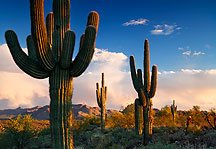 It's healthy! It's green! It's Julie Andrews bouncing through a field of poppys in Switzerland!
It's healthy! It's green! It's Julie Andrews bouncing through a field of poppys in Switzerland! It's LOHAS!
No, no, no, not alohas. Say LOHAS! Please don't say ALOHA...if
Okay, sorry... it's actually a Radiohead live at Red Rocks 2008 brought to you by Bud Light tripfest. Got my wires crossed there.
So back to Aloha...uh, I mean LOHAS. Come on everyone, jump on the bandwagon! Jumping on the bandwagon, in a literal sense, would actually be the exact right thing to do, since bandwagons as I understand them are horse-driven, and therefore eco-friendly.
The LOHAS term is used to describe people who hold several key values, including:
- Long-term View – They strive to improve the quality of life for the world’s present population while trying to ensure that future generations have options to grow unburdened by the delayed costs of our present growth and development policies.
- Holistic Perspective – At its most abstract level, they look at the whole, the parts, and the intertwining and interaction of the parts to understand a given problem. They look at the interdependence of humans, machines and the environment in the broadest terms. At a more practical level, they look at the holistic interdependence of economic factors, community development and the physical environment as an essential starting point in analyzing problems and in coming up with workable solutions.
- Stewardship of Natural Resources – A fundamental perspective of LOHAS is understanding the limits of exploiting our natural resources and the environment. A LOHAS goal is to live a sustainable life. That is, how do we protect and preserve the resources of our planet and how do we use these resources most efficiently and safely.
- Empowerment Through Knowledge – The LOHAS worldview is built on the broadest possible sharing of knowledge. This sharing allows communities to empower themselves, plan effectively and make cooperative decisions where all of the stakeholders have the maximum access to information that is critical to the problem at hand. They believe everyone should live a life of continuous learning to enhance their personal development and that everyone has a responsibility to educate others of their insights.
- Accepting Responsibility – The key LOHAS values of "Sustainability" and "Wellness" are empty intellectual concepts unless people and organizations act upon those values. Businesses bear a heavy responsibility in re-orienting our society along sustainable development lines. Their corporate social responsibility involves: understanding the life-cycle of products from initial concept and design to final end-use and recycling, eliminating waste in the production process wherever possible, reducing or eliminating toxic substances used in the process, reducing energy usage, using “full-cost accounting”, producing with zero defects, promoting intelligent consumerism and turning formerly negative aspects of production into positive aspects that improve the bottom line and competitive position of companies. Government agencies have the opportunity to make government “greener” and more efficient by showing the way for the private sector because of their vast procurement expenditures, energy usage, waste and recycling policies. Government can also promote model behavior by rewarding early adopters of sustainability with legislative and financial incentives. Ultimately, consumers have to be convinced that sustainability is important to the quality of their lives and to the lives of future generations. Unless each of us starts taking significant steps towards building a sustainable society, we may face catastrophic social and environmental crises after we have foregone many options with easier or lower social costs.
- Prevention & Wellness – They believe people should strive to reduce health risk factors through prevention, self-knowledge and wellness activities.
- Social Justice – They believe that social justice should prevail over self-aggrandizement, sexism, racism and unsound government policies.
- Authenticity – They are adamant that “authenticity” should be at the core of people’s lives, culture, products, and communities, in other words – “people should practice what they preach.”
- People all across America and the world have used LOHAS concepts to restructure their lives to be more in harmony with these values. Most of these lifestyle changes have been small, such as starting with “dolphin safe” tuna or cosmetics free from animal testing. Yet, over the last several decades, LOHAS lifestyles have spread to every corner of the country and to every demographic group.
Ideas about health, environment, business, energy or community development that were once considered “fringe” or “radical” are now part of the mainstream of American life. The medical profession and government agencies now understand that prevention of disease is just as important as advancing new treatments and providing an equitable distribution of medical services.
Many major corporations are slowly realizing that promoting health and safety on the job and using sustainable business practices help the long-term bottom line and improve the global competitiveness of the company. Local utility companies are promoting energy conservation and encouraging the deployment of renewable energy sources. Local and state political leaders are seeing the holistic “big picture” of economy, environment and social equity when it comes to making development decisions for their communities.
SIZE OF LOHAS AUDIENCE – 68 Million Adults in the U.S.
Why are LOHAS values important?
Because of the sheer magnitude of the number of people who are organizing their lives, their families and their communities around LOHAS values. Today, over 68 million adults in the U.S., or 32.3%, are part of the LOHAS market (Natural Marketing Institute). That is 1 of every 4 adults! If we include the an additional 30 million people who are just becoming aware of the meaning and benefits of LOHAS lifestyles, that brings the ratio up to an astounding 1 in 3 American adults.
Although these huge numbers are impressive, it is very difficult to identify LOHAS consumers through conventional demographic measures. LOHAS consumers are a representative sample of the U.S. population as a whole. Their ages, income and race match national sample profiles. They are not only Baby Boomers, but range in age from 18 to 70 years. Only two demographic characteristics really stand out: they are more highly educated and over 60% are women.
What unites LOHAS consumers is their shared values. They share a whole way of life and a whole set of beliefs about how the world works. They are skeptical and discerning. They have a different set of priorities than other Americans about what is important in life. They are continually redefining what success means. LOHAS consumers often choose careers that pay less, but offer other social compensations.
They are very creative. They start new businesses, new social movements, new ways of life, and new ways of seeing the world. They are personally and socially constructive. They are engaged in life. They are grounded optimists. Experience is often more important to them than the accumulation of products. That’s one of the reasons why spas and eco-tourism are booming industries.
So there it is...a tip of the top hat to lohaslifestyles.com for the information. Here's a good site to get you started in a most tubular and LOHAS of a way: LOHAS: Lifestyles of Health and Sustainability - LOHAS S















